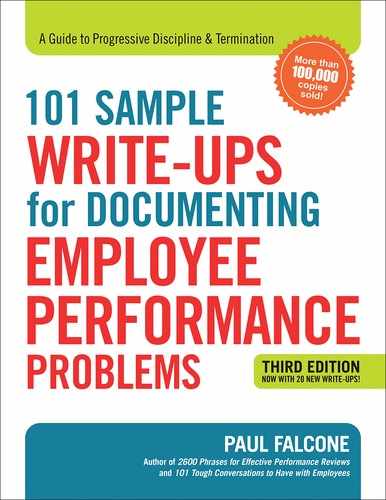Caution Regarding Restrictions Related to Disciplining or Terminating Employees for Attendance and Tardiness
Following is an important word of caution regarding disciplining employees for excessive absenteeism or tardiness related to an employee’s or an employee’s family member’s health condition: The law is changing constantly in this area, and it is critical that you check with qualified legal counsel to ensure that your attendance policy is up-to-date and that your disciplinary methods and procedures are compliant with state and local laws. These laws protect employees who need time off from work due to their own sickness or health condition, to care for a family member, or for other protected reasons.
The samples that follow in this chapter will be very helpful in terms of setting forth your strategy for dealing with workers who appear to abuse the company’s attendance, tardiness, or FMLA policies and practices. However, a “one size fits all” approach to discipline will not work when administering corrective action and potentially terminating for these particular workplace infractions. The landscape has changed drastically in this area, and several states and cities have enacted “paid sick leave” laws that protect workers who are absent or tardy pursuant to these laws. Therefore, it’s critical that you proceed with caution before disciplining and especially before terminating workers for excessive absenteeism, tardiness, or FMLA abuse.
Beginning with the passage of the Americans with Disabilities Act (ADA) in 1990 and the Family Medical Leave Act (FMLA) in 1993, substantial limits were placed on employers’ abilities to terminate workers under attendance control policies that, for decades, were able to withstand legal scrutiny. The limitations have become even more restrictive with the recent passage of multiple states’ and cities’ paid sick leave laws, where legislation has made it even more difficult for employers to hold workers accountable for the excessive use or abuse of paid time off or sick leave policies.
As a result, disciplining employees for unscheduled absences now has additional limits. For example, employers may no longer require doctors’ notes or specific advance notice under many paid sick leave laws, and “patterns” may not be established just because someone takes off on the Friday before a holiday, provided the employee uses paid sick time pursuant to one of these paid sick leave laws. Therefore, it’s critical that you check with qualified legal counsel to redraft your current attendance policy and your proposed disciplinary procedures if your state or city is subject to paid sick leave statutes.
Ensure that your employees who manage leaves of absence know how to distinguish between pure unscheduled absence occurrences and time off from work that may otherwise be protected by the federal ADA and FMLA laws (and similar state laws) and/or your state’s or city’s paid sick leave laws. Ensure that your leave of absence team understands how to calculate, track, and notify employees about paid sick leave under these statutes. And train your frontline leaders so they understand that when legally mandated paid sick leave is involved, they may not have the discretion to discipline their workers as they have typically done in the past.
Finally, expect a lot more press about paid sick leave and other issues relating to employee rights, minimum wage, gender pay parity, and the like. While these matters may change depending on the administrations in Washington, D.C., and states’ and even cities’ individualized attempts to govern the workplace, one thing is for sure: These types of laws will continue to evolve and confound employers who are looking for a reasonable and balanced approach to applying attendance rules fairly.
